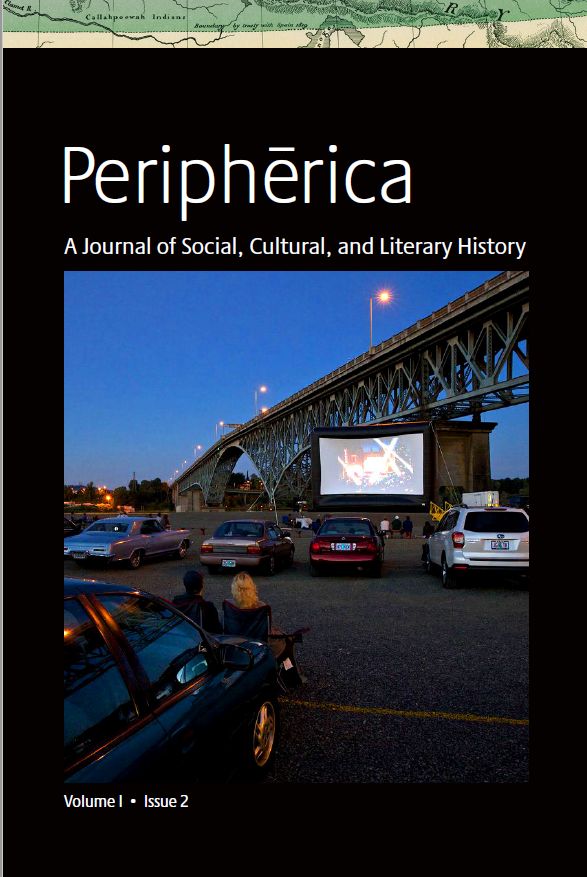Viaje a un mito de autor a través de los géneros en <i>El muerto y ser feliz</i> (Javier Rebollo 2012)
DOI:
https://doi.org/10.5399/uo/peripherica.1.2.5Abstract
At a time when the concept of auteur cinema is being deeply questioned, the cinematographic work of Spanish director Javier Rebollo (1969-) can be understood as a sample of formal characteristics and experimental narratives leading to a reaffirmation of director as an auteur. In Rebollo’s third film, El muerto y ser feliz (The Dead Man and Being Happy 2012), Santos, a dying hitman, goes on a journey from Buenos Aires to Northern Argentina that progressively acquires a symbolic meaning, as it is a journey from civilization to nature, from life to death, and, ultimately, from history to myth. The physical decline of Santos and his overcoming of physical death–and of linear time–through his transformation in myth, is parallel to a deconstruction of traditional cinematic language in the movie. Through a meta-reflective articulation of the road movie genre and through the distancing effect caused by the existence of two narrators who, competing with each other, simultaneously construct and deconstruct Santos’ story with their ironic and polysemic words, Rebollo attempts to reaffirm his position as a director-auteur, as the sole creator of an auteur myth (“mito de autor”) versus the traditional myth, oral and collective by nature.References
Jordan, Barry, y Mark Allinson. Spanish Cinema. A Student’s Guide. London: Hodder Arnold, 2005.
Casamerica. “El muerto y ser feliz, Javier Rebollo.” Videoclip en línea. Youtube, 25 abr. 2013, www.youtube.com/watch?v=N5zFJM8_8Mc&t=22s
Corrigan, Matthew. “Genre, Gender, and Hysteria. The Road Movie in Outer Space.” A Cinema Wihout Walls: Movies and Culture after Vietnam. New Brunswick, N.J: Rutgers University Press, 1991. 137-160.
Eliade, Mircea. Lo sagrado y lo profano. Barcelona: Paidós, 1998.
García Ochoa, Santiago. “Algunas notas sobre la aplicación de la categoría de género cinematográfico a la Road Movie.” Liño: Revista Anual de Historia del Arte 15 (2009): 187-196.
“Javier Rebollo.” The Internet Movie Database. IMBD.com, Inc, n.d., www.imdb.com/name/nm1503559/
Mazierska, Ewa y Laura Rascaroli. Crossing New Europe. Postmodern Travel and the European Road Movie. London: Wallflower Press, 2006.
El muerto y ser feliz. Dir. Javier Rebollo. Act. José Sacristán, Roxana Blanco. Splendor Films, 2012. DVD.
“El muerto y ser feliz, cine de vanguardia por el que hay que luchar.” Tuotrodiario. Hola.com. Hola S.L., 3 en. 2013, www.eldiario.es/politica/muerto-feliz-cine-vanguardia-luchar_0_86441726.html
Penalva, Joaquín Juan. “La leyenda de Santos y Camborio.” El espectador imaginario. Aula crítica, my. 2013, www.elespectadorimaginario.com/el-muerto-ser-feliz/
Pérez, Jorge. Cultural Roundabouts: Spanish Films and Novel on the Road. Lewisburg, PA: Bucknell University Press, 2011.
Rebollo, Javier. “No busco que el espectador se identifique con mis personajes.” Entr. Fernando G. Varea. Espacio Cine. Wordpress.com, 23 nov. 2012, www.espaciocine.wordpress.com/2012/11/23/javier-rebollo/
- - -. “El muerto y ser feliz es una película clásica hecha por un moderno.” Entr. Juan Sardá. El Cultural. El Mundo. Unidad Editorial, S.A., 10 en. 2013, www.elcultural.com/noticias/buenos-dias/Javier-Rebollo/4241
Salles, Walter. “Notes for a Theory of the Road Movie.” New York Times Magazine 11 nov. 2007: 66-70.
Sánchez, S. “El muerto y ser feliz: Carretera y manta.” Cultura. La Razón. Audiviosual Española S.A., 11 en. 2013, www.larazon.es/el-muerto-y-ser-feliz-carretera-y-manta-FY652272
Taipe Campos, Nestor G. “Los mitos. Consensos, aproximaciones y distanciamientos teóricos.” Gazeta de antropología 20, 16 (2004), www.ugr.es/~pwlac/G20_16NestorGodofredo_Taipe_Campos.html
Vidal Sanz, Rafael. “El muerto y ser feliz: el héroe moderno es siempre una paradoja.” Extracine. Hipertextual, 2 mzo. 2013, www.extracine.com/2013/03/critica-de-el-muerto-y-ser-feliz



